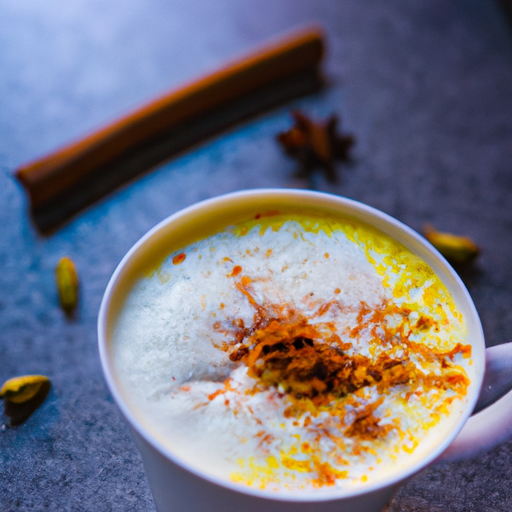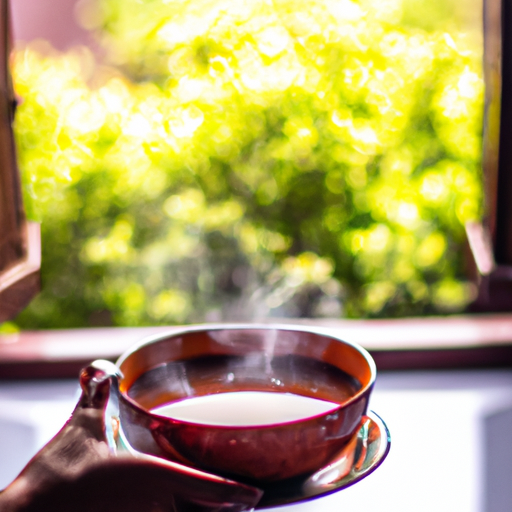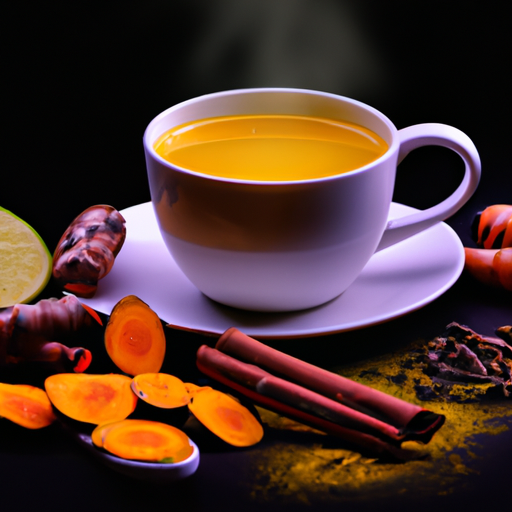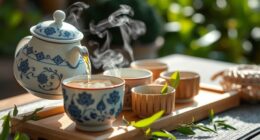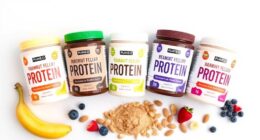Imagine starting your day with a warm, comforting drink that not only satisfies your taste buds but also provides numerous health benefits. That’s exactly what turmeric milk tea offers. Let’s meet Jane, a 40-year-old woman who struggled with chronic inflammation and digestive issues. She discovered the wonders of turmeric milk tea and saw a remarkable improvement in her overall well-being.
Turmeric milk tea, also known as golden milk or haldi doodh, has a rich history and cultural significance. This vibrant yellow beverage originated in ancient Ayurvedic traditions and has been enjoyed for centuries in various cultures around the world. It is made by combining turmeric, a bright yellow spice known for its potent anti-inflammatory properties, with warm milk and other flavorful ingredients.
But what exactly makes turmeric milk tea so special? Well, the key lies in its powerful combination of ingredients. Turmeric contains an active compound called curcumin, which has been extensively studied for its potential health benefits. From reducing inflammation to supporting digestion and promoting overall well-being, turmeric milk tea is a true nutritional powerhouse.
In this article, we will explore the origins, ingredients, health benefits, and potential risks of turmeric milk tea. We will also provide a step-by-step guide on how to make this delicious beverage at home.
So, get ready to delve into the world of turmeric milk tea and discover how it can enhance your health and well-being.
Key Takeaways
- Turmeric milk tea, also known as golden milk or haldi doodh, is a beverage made by combining turmeric, warm milk, and other flavorful ingredients.
- Turmeric milk tea has a rich history and cultural significance, originating in ancient Ayurvedic traditions and enjoyed for centuries in various cultures around the world.
- Turmeric milk tea offers numerous health benefits, including anti-inflammatory effects, digestive support, immune system boost, and joint health.
- It is important to consider safety considerations and potential interactions with medications when consuming turmeric milk tea, and consulting with a healthcare professional is recommended.
Historical Origins and Cultural Significance of Turmeric Milk Tea
Turmeric milk tea, also known as ‘golden milk,’ has a rich history and deep cultural roots. Its origins can be traced back centuries. This vibrant beverage has been consumed for centuries in traditional Ayurvedic practices in India and has gained popularity worldwide in recent years.
Turmeric, the main ingredient in this drink, has been used for its medicinal properties in Ayurveda for over 4,000 years. It is known for its anti-inflammatory and antioxidant effects, as well as its potential to support digestion and boost immunity.
Turmeric milk tea is often consumed as a soothing and warming beverage, especially during the colder months. Its cultural significance extends beyond its health benefits, as it is often associated with rituals and celebrations in Indian culture.
Now, let’s delve into the key ingredients in turmeric milk tea.
Key Ingredients in Turmeric Milk Tea
To make this comforting drink, you’ll need a vibrant golden spice, warm creamy liquid, and a soothing infusion. Turmeric milk tea, also known as golden milk or haldi doodh, is made by combining turmeric powder with milk or a plant-based milk alternative. Turmeric, the star ingredient in this drink, is known for its anti-inflammatory and antioxidant properties. The warm creamy liquid provides a smooth and velvety texture to the tea, making it a cozy and comforting beverage. The soothing infusion of flavors from spices like cinnamon, ginger, and cardamom adds depth and complexity to the drink. There are various flavor variations and alternative recipes available, allowing you to customize the drink according to your taste preferences. Now, let’s explore the potential health benefits of turmeric milk tea.
Potential Health Benefits of Turmeric Milk Tea
Indulging in a cup of this golden elixir could be the key to unlocking a world of potential health benefits, like soothing inflammation and boosting your immune system. Here are four ways that turmeric milk tea may benefit your health:
-
Anti-inflammatory properties: Turmeric contains curcumin, a powerful compound known for its anti-inflammatory effects. Consuming turmeric milk tea may help alleviate inflammation in the body.
-
Digestive support: Turmeric milk tea has been traditionally used to aid digestion. The combination of turmeric and warm milk can help soothe an upset stomach and promote healthy digestion.
-
Immune system boost: Turmeric has antimicrobial and antioxidant properties that can support a healthy immune system. Drinking turmeric milk tea regularly may help strengthen your body’s natural defenses.
-
Joint health: The anti-inflammatory properties of turmeric may also benefit joint health. Some studies suggest that turmeric may help reduce joint pain and stiffness.
Now, let’s explore how to make turmeric milk tea at home.
How to Make Turmeric Milk Tea at Home
Creating your own golden elixir at home is as simple as combining warm, comforting spices with a creamy, soothing liquid. Turmeric milk tea, also known as golden milk or haldi doodh, is a traditional Ayurvedic beverage that has gained popularity for its potential health benefits. This vibrant drink is made by blending turmeric, a bright yellow spice known for its anti-inflammatory properties, with milk and other spices like ginger, cinnamon, and black pepper. The combination of these ingredients creates a flavorful and aromatic beverage that can be enjoyed both hot and cold. Variations of turmeric milk tea include adding honey or maple syrup for sweetness, or using alternative milk options like almond or coconut milk. Incorporating turmeric milk tea into your diet may offer several health benefits, including improved digestion, reduced inflammation, and enhanced immune function. However, it is important to note that turmeric milk tea may not be suitable for everyone, and individual tolerance and potential interactions with medications should be considered. Transitioning into the next section, it is crucial to explore the safety considerations and potential side effects of consuming turmeric milk tea.
Safety Considerations and Potential Side Effects
When considering the safety of turmeric milk tea, there are several important factors to take into account. First, it’s essential to be aware of any allergies or sensitivities to turmeric or its related plants, as this could lead to adverse reactions.
Additionally, turmeric has the potential to interact with certain medications, so it’s crucial to consult with a healthcare professional if you’re taking any prescription drugs.
Lastly, understanding the recommended dosage and consumption guidelines is vital to ensure that you’re reaping the benefits of turmeric milk tea without exceeding safe levels.
Allergies and Sensitivities
If you have a sensitive system, be cautious about incorporating turmeric milk tea into your daily routine as it may be a double-edged sword, acting as both a soothing elixir and a potential trigger for allergies. Turmeric, the main ingredient in the tea, contains a compound called curcumin, which has been shown to have anti-inflammatory and antioxidant properties. While these properties can be beneficial for many people, those with food intolerances or a compromised immune system may experience an adverse immune system response to turmeric. Allergies to turmeric are rare but can occur. It’s important to be aware of any potential allergies or sensitivities before incorporating turmeric milk tea into your diet. As with any new dietary addition, it’s always best to consult with a healthcare professional. Moving onto the next section about interactions with medications…
Interactions with Medications
Be cautious about incorporating turmeric milk tea into your daily routine if you take medications, as there can be potential interactions that could affect their effectiveness. Interactions between medications and turmeric milk tea can occur due to the active compound in turmeric called curcumin, which can interfere with the metabolism and absorption of certain drugs. Here are some important points to consider:
-
Be cautious about incorporating turmeric milk tea into your daily routine if you take medications. There can be potential interactions that could affect their effectiveness. Interactions between medications and turmeric milk tea can occur due to the active compound in turmeric called curcumin, which can interfere with the metabolism and absorption of certain drugs.
-
Blood thinners: Turmeric milk tea may enhance the effects of blood-thinning medications, increasing the risk of bleeding.
-
Diabetes medications: Turmeric milk tea may lower blood sugar levels, which can interfere with diabetes medications.
-
Stomach acid reducers: Turmeric milk tea may increase stomach acid production, which can counteract the effects of acid-reducing medications.
-
Anti-inflammatory drugs: Turmeric milk tea has natural anti-inflammatory properties, so combining it with certain medications may increase the risk of side effects.
It’s crucial to consult with a healthcare professional or pharmacist before incorporating turmeric milk tea into your routine to ensure it’s safe and appropriate for you. Moving on to recommended dosage and consumption guidelines…
Recommended Dosage and Consumption Guidelines
Contrary to popular belief, there’s no one-size-fits-all dosage for reaping the benefits of this golden elixir. When it comes to consuming turmeric milk tea, the recommended dosage can vary depending on individual factors such as age, weight, and overall health. However, a general guideline is to consume 1-2 cups of turmeric milk tea per day to experience its potential health benefits.
It’s important to note that excessive consumption of turmeric milk tea may lead to health risks, such as digestive issues or allergic reactions. It’s always best to consult with a healthcare professional, such as a nutritionist or registered dietitian, to determine the appropriate dosage for your specific needs.
Transitioning into the next section, turmeric also has other uses and applications beyond just being consumed as a tea.
Other Uses and Applications of Turmeric
Try incorporating turmeric into your daily routine and experience the amazing health benefits it offers. You can use it in various recipes or incorporate it into your skincare routine. Turmeric is not only a popular spice in culinary dishes, but it also has benefits for your skin. Its anti-inflammatory properties can help reduce redness and irritation, making it a great addition to facial masks or creams. Additionally, turmeric can be used as a natural remedy for acne, thanks to its antibacterial properties.
In terms of culinary uses, turmeric adds a warm, earthy flavor to dishes like curries, soups, and stir-fries. Its vibrant yellow color also makes it a beautiful natural food coloring. However, it’s important to note that excessive consumption of turmeric can cause stomach upset or interact with certain medications.
In the next section, we’ll discuss the conclusion and final thoughts on turmeric milk tea.
Conclusion and Final Thoughts on Turmeric Milk Tea
In sum, incorporating turmeric into your daily routine can add a vibrant and soothing element to your skincare and culinary experiences, enhancing both your well-being and taste buds. Turmeric milk tea, also known as golden milk, is a versatile beverage that can be enjoyed in various ways.
There are countless turmeric milk tea recipes available, allowing you to explore different variations and flavors. From traditional recipes with simple ingredients like turmeric, milk, and honey, to more complex variations with added spices like ginger, cinnamon, or cardamom, the possibilities are endless. You can also experiment with different types of milk, such as almond, coconut, or oat milk, to suit your personal preferences.
Whether you prefer a warm and comforting cup of turmeric milk tea or a refreshing iced version, this golden elixir is a delicious and nutritious addition to any healthy diet.
Frequently Asked Questions
Can turmeric milk tea be consumed during pregnancy?
Turmeric milk tea can be consumed during pregnancy. It offers several benefits for pregnant women, including anti-inflammatory properties and potential aid in digestion. However, it is important to consult with a healthcare professional before adding it to your diet.
Are there any potential interactions between turmeric milk tea and certain medications?
Potential drug interactions may occur between turmeric milk tea and certain medications due to its effects on liver health. It is important to consult with a healthcare professional before consuming turmeric milk tea if you are taking any medications.
Can turmeric milk tea help with weight loss?
Turmeric milk tea, known for its numerous health benefits, may aid in weight loss. Its anti-inflammatory properties and potential role in digestion make it a valuable addition to a healthy diet. Try this simple turmeric milk tea recipe for maximum benefits.
Does turmeric milk tea have any effect on skin health?
Turmeric milk tea may have positive effects on skin health. It is known for its anti-inflammatory properties, which can help reduce acne and improve skin complexion. However, it is important to note that individual results may vary and there may be potential side effects.
What is the recommended daily intake of turmeric milk tea for maximum health benefits?
The recommended daily intake of turmeric milk tea for maximum health benefits is 1-2 cups. Consuming this amount can provide a range of health benefits, such as reducing inflammation and supporting digestion.
Conclusion
In conclusion, turmeric milk tea is a nutritious and beneficial beverage that can easily be incorporated into a healthy diet. It has a rich history and cultural significance, being enjoyed for centuries. Its key ingredients, including turmeric and milk, offer numerous health benefits, such as anti-inflammatory properties and potential digestive support.
When made at home using evidence-based information and scientific research, turmeric milk tea can be a delicious and safe addition to your daily routine. It’s like a warm hug on a cold day, providing comfort and nourishment to your body.

